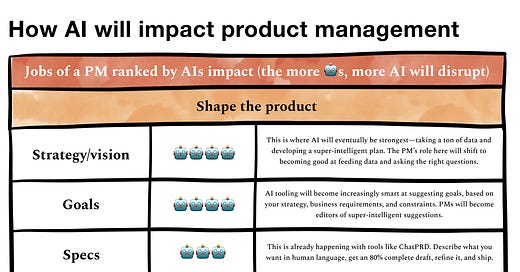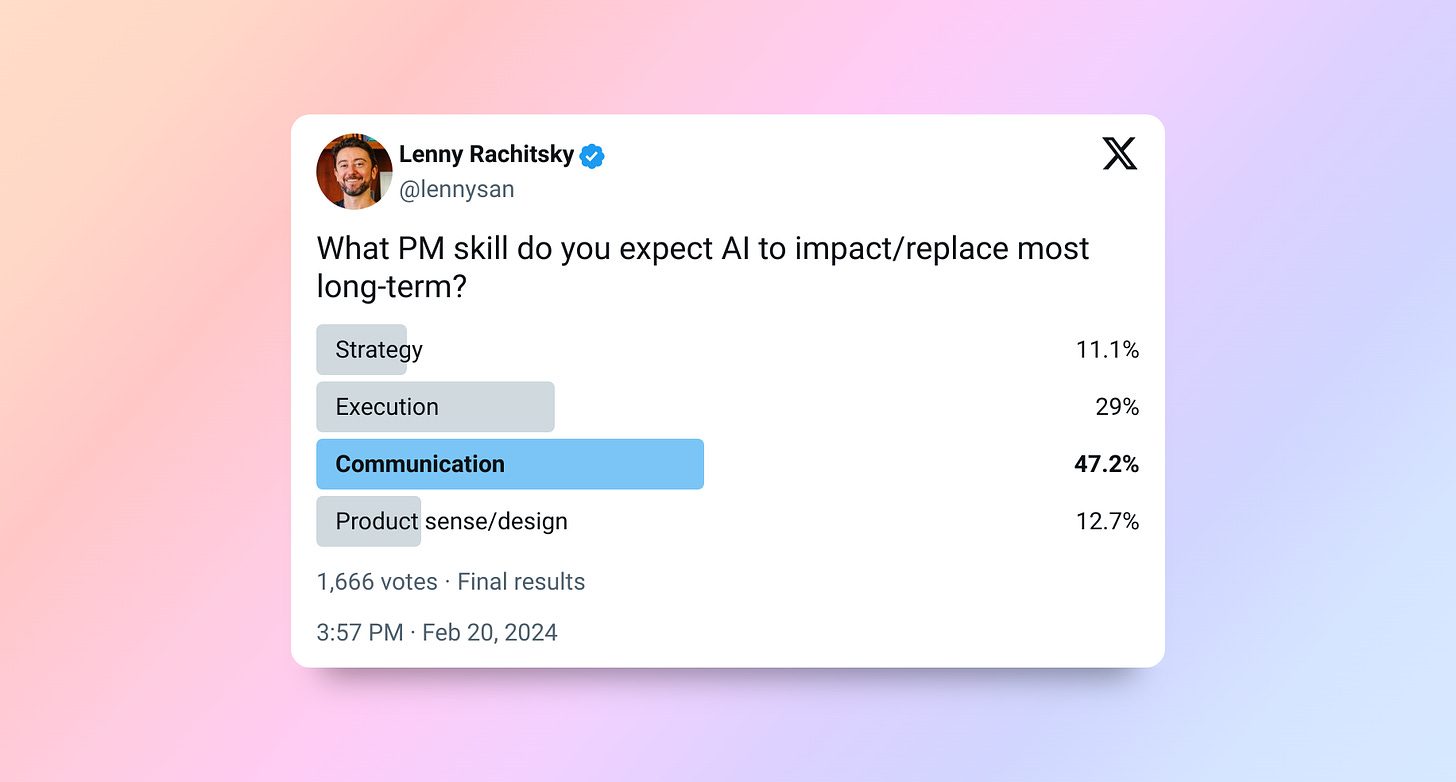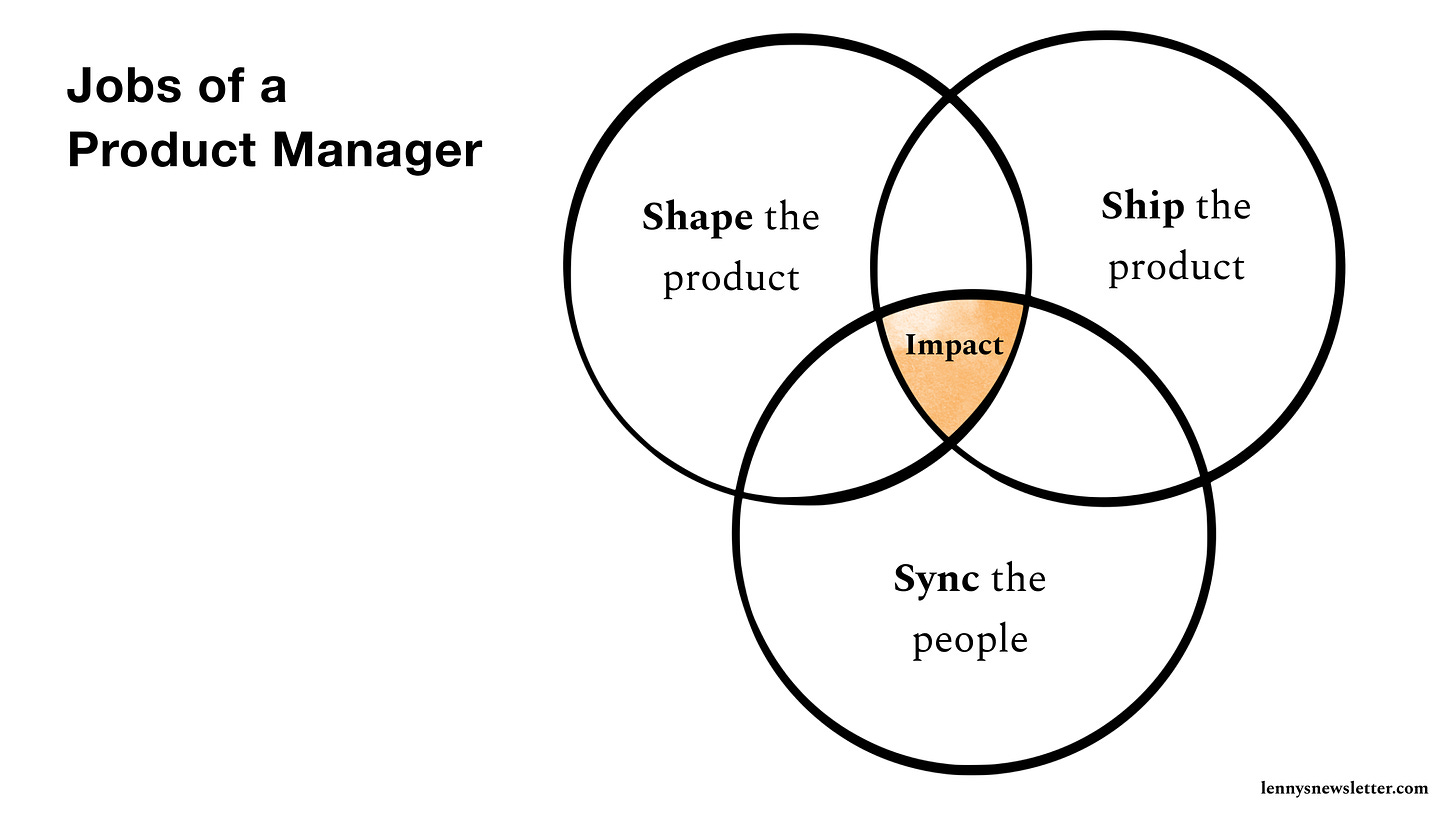How AI will impact product management
Which skills will be affected or replaced, and which will become even more valuable
👋 Hey, I’m Lenny and welcome to a 🔒 subscriber-only edition 🔒 of my weekly newsletter. Each week I tackle reader questions about building product, driving growth, and accelerating your career.
P.S. Check out my PM recruiting service (helping you hire Sr. PMs and VPs), Lennybot (an AI chatbot trained on my newsletter posts, podcast interviews, and more), and my swag store (great gifts for your favorite PM, or yourself!).
Q: I’d love to see a list of core skills for PMs and to what extent they’ll be replaced/impacted/influenced by AI.
I’ve been thinking about this question a lot. AI is coming for many jobs, but it’s different when it comes for yours. Is the PM job one of the first to be replaced or one of the last? What skills will be most, and least, valuable in this fast-approaching future?
As I often do when thinking about a question, I ran a poll on Twitter and LinkedIn asking which core skills of product management folks think are most likely to be impacted/replaced by AI. Here are the results:
Here’s the thing: I believe the truth is the complete opposite.
Some may think that because AI is good at helping them write and accomplish small tasks today, soon it’ll take over most of the low-level communication, collaboration, and execution work we do.
Instead, I believe that AI will have the most profound impact on the high-level (and historically most valued) skills of product management: developing a strategy, crafting a vision, identifying new opportunities, and setting goals. Furthermore, soft skills like product sense, communication, creativity, and being the glue that enables a team to operate at their very best will become even more important (and a differentiator among companies).
Think about it—what is AI best at? Taking gigabytes of data, analyzing it, and giving succinct and (increasingly) insightful answers. That sounds a lot like a tool that would be incredibly good at identifying a clever strategy.
If this sounds unlikely, remember move 37 in the match between AlphaGo and Lee Sedol (one of the world’s top Go players). AI saw something no human had ever seen in playing the game for over 4,000 years.
“With the 37th move in the match’s second game, AlphaGo landed a surprise on the right-hand side of the 19-by-19 board that flummoxed even the world’s best Go players, including Lee Sedol. ‘That’s a very strange move,’ said one commentator, himself a nine dan Go player, the highest rank there is. ‘I thought it was a mistake,’ said the other. […]
Indeed, the move turned the course of the game. AlphaGo went on to win Game Two, and at the post-game press conference, Lee Sedol was in shock. ‘Yesterday, I was surprised,’ he said through an interpreter, referring to his loss in Game One. ‘But today I am speechless.’”
Another example—when Sam Altman, CEO of OpenAI, was asked four years ago how OpenAI would make money, here was his answer:
“We have made a soft promise to investors that once we’ve built this generally intelligent system, we will ask it to figure out a way to generate an investment return.”
Similarly, here’s Jensen Huang, CEO of Nvidia, telling people that soon no one is going to have to learn how to program, because AI will program for us:
“Everybody who sits on a stage like this would tell you it is vital that your children learn computer science. That everybody should learn how to program. In fact, it’s almost exactly the opposite. It is our job to create computing technology such that nobody has to program. That the programming language is human. Everybody in the world is now a programmer. This is the miracle of artificial intelligence.”
These are arguably the smartest people in the world when it comes to AI, and they are saying that historically high-level skills like engineering and business (and game) strategy are going to be solved by AI. It’s actually already happening in engineering (check out Devin and Magic).
On the other side, what are people best at? People stuff! Aligning opinionated stakeholders, unblocking blockers, pushing teams to work harder, creating amazing experiences, getting buy-in on big ideas, understanding and acting on nuance, etc. I’m not saying AI won’t be better than humans at this stuff one day (check out Hume 🤯), or at least very helpful. I’m saying that these soft skills are where AI won’t take over for a long while, and thus they are the skills you should be cultivating more than ever.
I once defined the job of a product manager as to “deliver business impact by marshaling the resources of your team to identify and solve the most impactful customer problems.” Essentially, to be the conductor/quarterback/glue of the team who pulls all the disparate pieces together to create great products and drive the business forward. I believe this will only increasingly become the case now that AI is one of your resources, and this element of the role will become ever more important.
Here are the besties making that case on the most recent All-In episode (2-minute clip):
To show you what I mean, I’ve created a semi-comprehensive list of the day-to-day work that a PM does and ranked how much I believe AI will disrupt that work on a scale of 1 to 5 🤖s (the more 🤖, the more AI will take it over). I’ve also included tools that can help with these jobs today that you may want to check out.
Disclaimers:
This assumes a world before super-intelligent AGI. Once we get there, all bets are off 😵💫
I’m not arguing that you should stop improving the skills that AI will be great at. I’m saying you should double down on strengthening your soft skills (e.g. communication, collaboration, product sense, influence) and learn how to work with AI on creating more leverage in your hard skills (strategy, vision, data, setting goals).
This post is just the beginning of a discussion. I’d love to hear what I’m missing or where I’m getting it wrong. Please tell me! Leave a comment with your thoughts once you’ve read the post 👇
As a framework to have this discussion, I think of the PM role as consisting of three jobs, each of which contains a number of tasks and skills:
1. Shape the product 🤖🤖🤖
This part of the job is where you determine/influence what your team builds, and it is where product management is the most different from project manager, or product owner. It’s also where you bring the most value to the org. Here’s the day-to-day product-shaping work of a PM, and how I believe AI will impact it:
1. 🤖🤖🤖🤖 Developing a product strategy and vision: Significantly impacted
The job: Analyzing your market, data, customers’ needs, and insights about the future to craft a winning product strategy and vision.
AI’s impact: This is where AI will eventually be strongest—taking a ton of data and developing a super-intelligent plan. The PM’s role here will shift to becoming very good at knowing what data to feed it and asking the right questions. And to be clear, I’m not saying you should quit building your strategic-thinking muscle—I’m just saying that AI will give you huge leverage here eventually.
Tools to explore: ChatGPT, Claude, Gemini, Perplexity, and here are examples of how people are already using ChatGPT to strengthen their thinking
2. 🤖🤖🤖🤖 Setting goals: Significantly impacted
The job: Picking KPIs, setting goals, drafting OKR docs, and creating dashboards to track these metrics.
AI’s impact: AI tooling will become increasingly smart at suggesting goals you should be optimizing for, based on your strategy, business requirements, and constraints. PMs will become editors of super-intelligent suggestions.
Tools to explore: ChatGPT, Claude, Gemini, Perplexity
3. 🤖🤖🤖 Creating specs: Considerably facilitated
The job: Crafting PRDs/1-pagers for engineers and designers to implement new products/features.
AI’s impact: This is already happening with tools like ChatPRD. Describe what you want in human language, get an 80% complete draft, refine it, and then ship.
Tools to explore: ChatPRD, WriteMyPRD, Uizard, and tldraw (to create mocks and prototypes)
4. 🤖🤖🤖 Discovery: Considerably facilitated
The job: Talking to customers, analyzing data, and getting input from sales and CX conversations to uncover insights about customer pain points and opportunities and inform what to build.
AI’s impact: Tools will make it significantly easier to find the signal in the noise. However, customers will still want to talk to real people to share their honest challenges, ideas, and experiences. Skills like empathy, communication, and creativity will become increasingly important for connecting with customers.
Tools to explore: Dovetail, Sprig, Kraftful, Notably, Viable, Maze, and a bunch of examples from readers
5. 🤖🤖 Building a roadmap: Facilitated
The job: Ideate, refine, prioritize, and get buy-in on a 3-to-6-month roadmap.
AI’s impact: AI tools will give you a strong first draft (taking in your strategy, user research, and goals) and help you prioritize ideas, but you’ll still spend time with your team brainstorming, reviewing data and user research, discussing tradeoffs, and refining your roadmap. The roadmap determines what your team does, so it’s hard to imagine significantly offloading this to AI for quite a while.
Tools to explore: Productroadmap.ai
6. 🤖🤖 Giving product/design feedback: Facilitated
The job: Provide feedback on designs, prototypes, and the final product before it goes live.
AI’s impact: This is where we’ll need (and want) human input for a long while—if for nothing else than to keep the user experience simple, cohesive, and delightful. This is also where companies will have the most opportunity to compete, once everyone’s got AI tools at their disposal. That being said, I can definitely imagine AI tools will get good at pointing out UX challenges and suggesting best practices.
2. Ship the product 🤖🤖
This part of the job is where PMs help their team, and org, ship high-quality products on time and free of surprises.






